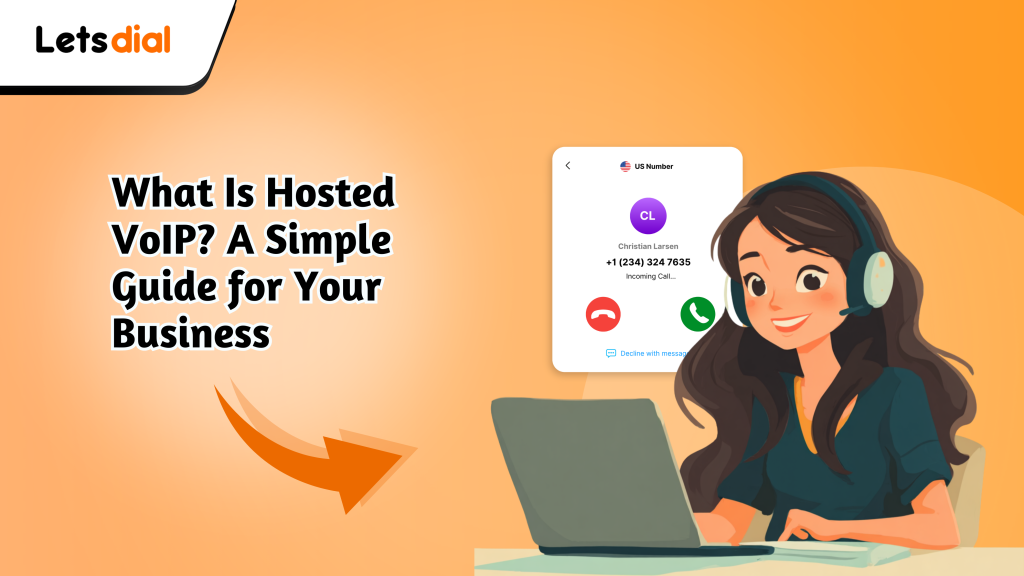Introduction
Stuck with a clunky, traditional phone system? If you’re tired of expensive on-site hardware, surprise maintenance bills, and a setup that chains your team to their desks, you’re not alone. Businesses today need flexibility and power, and that’s where hosted VoIP comes in.
You’ve likely heard the term, but what is hosted VoIP in simple terms?
Think of it like Netflix for your business phone system. Instead of buying and maintaining a complex library of hardware (like a DVD collection), you stream a feature-rich, always-updated service over your internet connection for a predictable monthly fee.
This guide will walk you through everything you need to know about hosted VoIP, how it works, and how it can transform your business communications.
What Is Hosted VoIP in Simple Terms?
Hosted VoIP (Voice over Internet Protocol) is a cloud-based phone system where a third-party provider manages all the technology, hardware, and software in their secure data centers. Instead of relying on traditional copper phone lines, your calls are transmitted securely over your existing internet connection.
This means you don’t need a server closet filled with complex PBX (Private Branch Exchange) hardware. All you need are IP-enabled phones or a simple app on your computer and smartphone to access an enterprise-grade communication system.
How Does Hosted VoIP Work? (A Step-by-Step Breakdown)
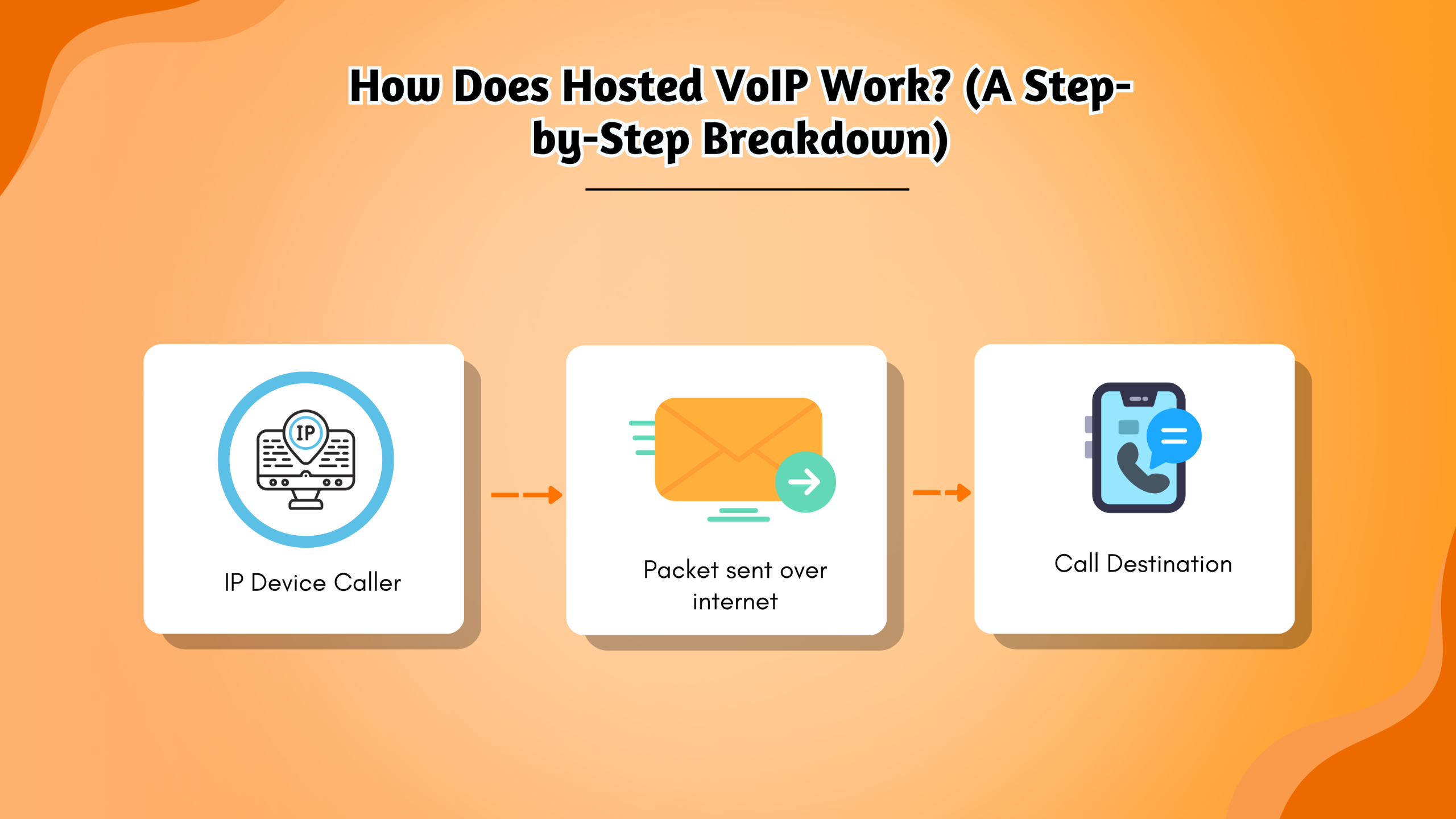
The technology behind hosted PBX is sophisticated, but the process is simple to understand.
- Your Voice Goes Digital : When you speak, analog sound waves are captured and converted into digital data using a codec. This process compresses your voice into data packets, similar to turning a photo into a JPEG. These packets are essential for transmitting your voice efficiently over the internet.
- Travel Over the Internet : Your voice, now digital packets, travels through your router and internet connection. Instead of a phone line, it moves with regular internet traffic like emails. These smart packets dynamically find the fastest route to your service provider’s data center, ready for the next stage.
- The Provider Directs Traffic : At the provider’s data center, the system reads each packet’s destination and instantly routes the call. This intelligent hub also manages advanced features like voicemail, call forwarding, and greetings. It ensures smooth delivery of calls without delay, acting as the brain of operations.
- Conversion Back to Voice : At the recipient’s device, packets are reassembled in order and converted back into analog sound. The result is a clear, natural voice heard in real time. This entire process—digitizing, transmitting, routing, and restoring—happens in milliseconds, making VoIP calls seamless and lifelike.
Hosted VoIP vs. Traditional Phone Lines (POTS)
The most significant leap forward with hosted VoIP is its departure from POTS (Plain Old Telephone Service). Here’s a quick comparison, including how testing‑ad services can help businesses evaluate and optimize their VoIP usage for better performance.
| Feature | Hosted VoIP | Traditional Phone Line (POTS) |
| Technology | Digital (Internet Protocol) | Analog (Copper Wires) |
| Upfront Cost | Low to none | High (On-site PBX hardware) |
| Maintenance | Handled entirely by the provider | Managed by your IT team or a contractor |
| Scalability | Excellent; add or remove users instantly | Difficult and costly; requires new hardware |
| Features | Rich suite included (Auto Attendant, etc.) | Basic; advanced features cost extra |
| Flexibility | Excellent; work from anywhere | Poor; tied to a physical location |
The Top 7 Business Benefits of Hosted VoIP
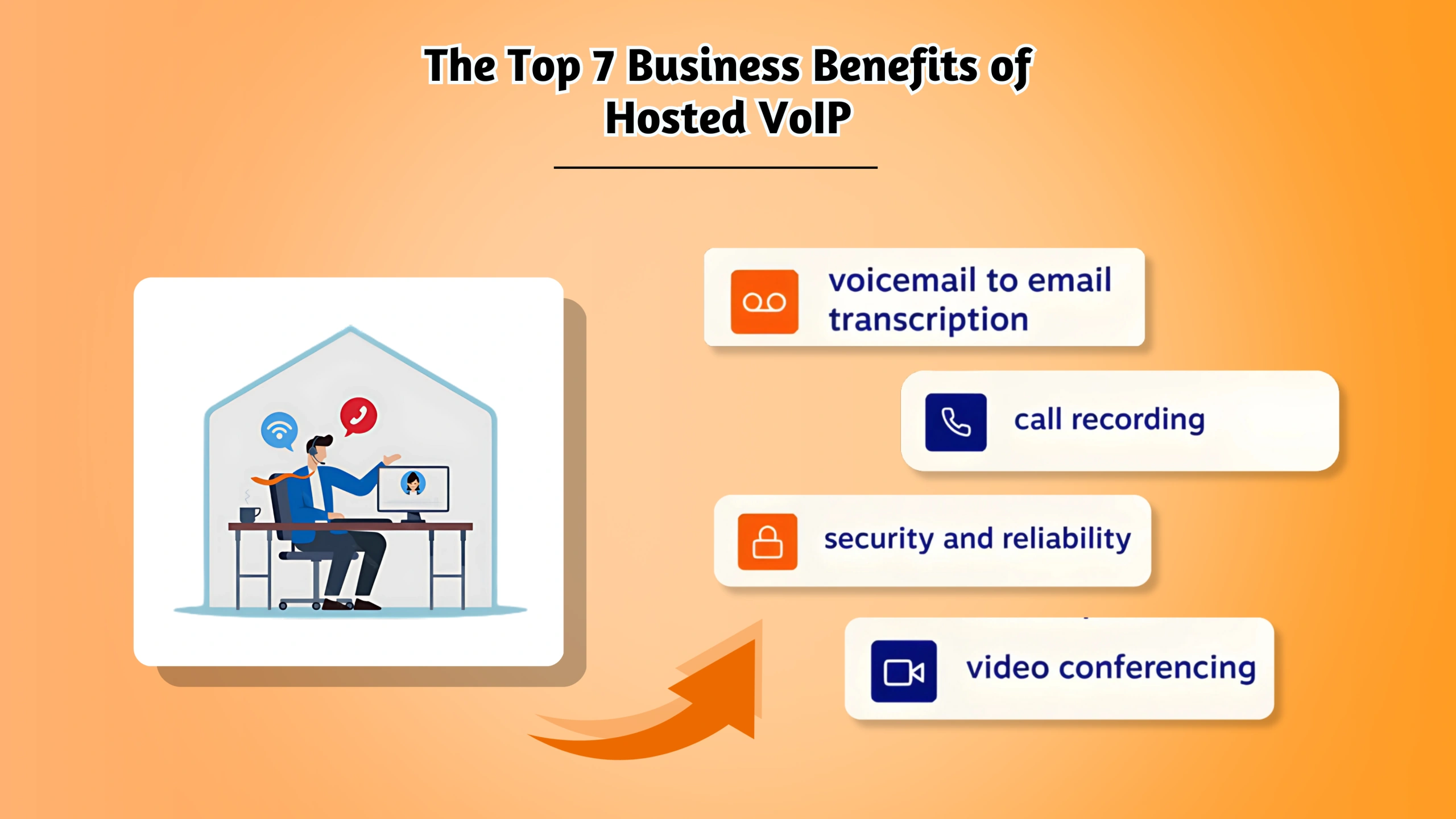
Why are so many businesses making the switch? Because the advantages go far beyond just making calls.
1. Significant Cost Savings
Eliminate the massive capital expense of on-premise PBX hardware. With a Cloud-Based VoIP system, you pay a predictable per-user monthly fee, reducing your phone bill by up to 60%. Enjoy free calls between office locations and lower long-distance and international rates.
2. Unmatched Flexibility & Remote Work Enablement
Your business number is no longer tied to a physical desk. Employees can make and receive calls from their business line on a desk phone, a computer app (softphone), or their personal mobile phone, allowing for seamless remote and hybrid work.
3. Powerful, Enterprise-Grade Features
Access dozens of powerful features that were once only available to large corporations. Tools like an auto attendant (virtual receptionist), advanced call routing, and voicemail-to-email transcription project a professional image and improve efficiency.
4. Effortless Scalability
Is your business growing? With Managed VoIP, adding a new employee is as simple as adding a new user in your online portal. No need to install new physical lines or call a technician. This system grows and shrinks with your business needs.
5. Low Maintenance & No IT Headaches
Your Cloud-Based VoIP provider handles all updates, security patches, and maintenance. This frees up your IT team to focus on core business initiatives instead of managing a complex and depreciating phone system.
6. Enhanced Reliability & Business Continuity
Top providers offer 99.999% uptime. Because the system is in the cloud, events like local power outages or internet disruptions don’t have to mean missed calls. You can automatically forward calls to mobile phones or other locations, ensuring you never lose contact with customers.
7. Robust Security
Reputable Managed VoIP providers operate from secure, geo-redundant data centers. They use advanced encryption and monitoring to protect your communications from threats, ensuring your calls and data remain private.
Must-Have Hosted VoIP Features to Look For
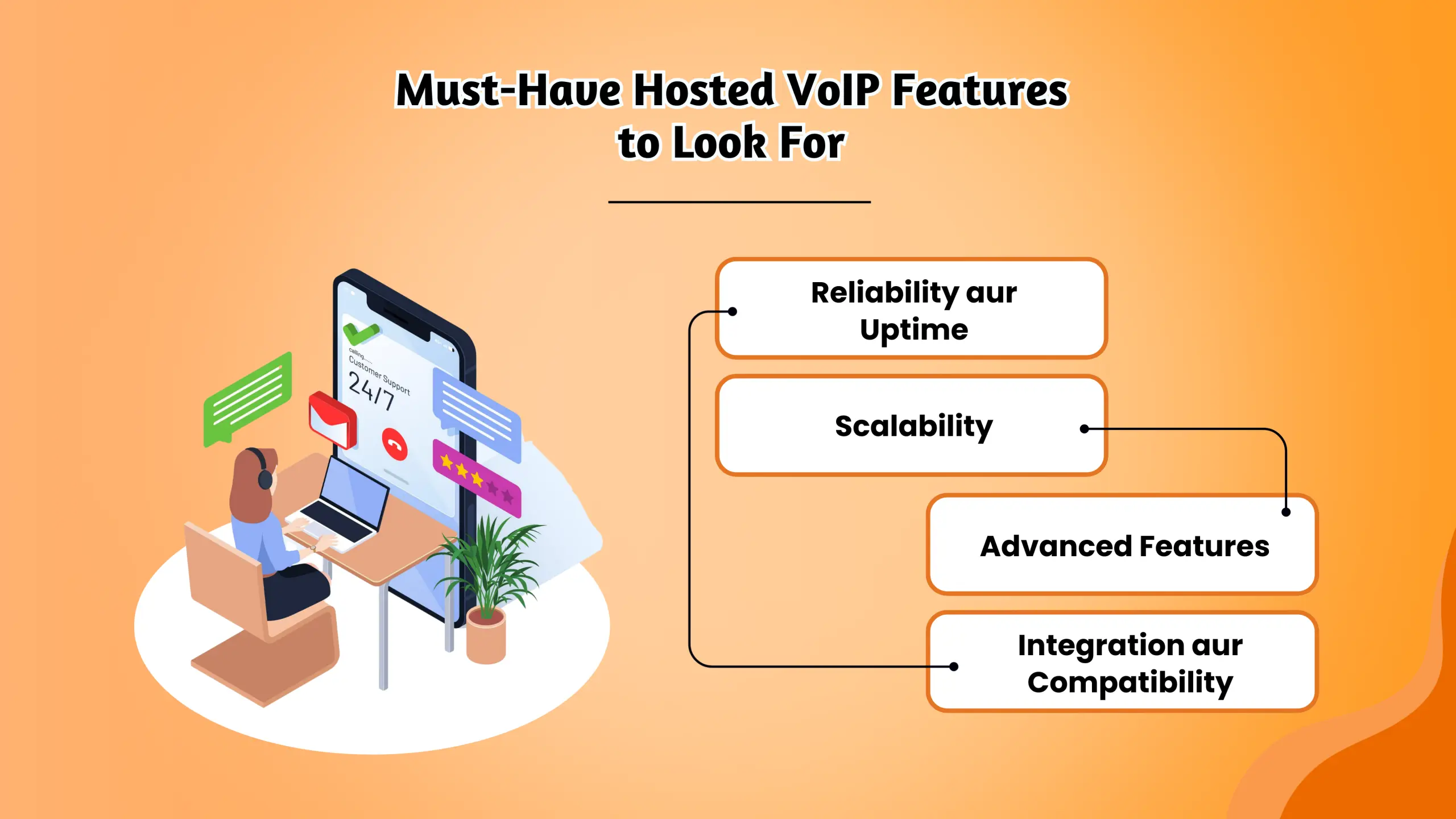
When evaluating providers, look for these essential features that deliver the most value.
Auto Attendant (Virtual Receptionist)
- What it is: An automated system that greets callers with a professional, pre-recorded message and provides a menu of options (e.g., “Press 1 for Sales, Press 2 for Support”).
- Why it matters: It ensures every call is answered and directed correctly, 24/7, without needing a human receptionist. This boosts professionalism and improves customer experience by connecting callers to the right department faster.
Advanced Call Routing
- What it is: The ability to create intelligent rules for where incoming calls go. This can be based on the time of day, caller ID, or the menu option selected in the auto attendant.
- Why it matters: It maximizes efficiency and ensures the most qualified person handles each call. You can route after-hours calls to a voicemail or an on-call employee, and route calls from VIP clients directly to a dedicated account manager, improving service levels.
Voicemail-to-Email with Transcription
- What it is: A feature that automatically converts audio voicemails into text and delivers both the audio file and the transcription directly to your email inbox.
- Why it matters: This is a massive time-saver. You can scan a voicemail’s content in seconds without having to listen to it, allowing you to prioritize callbacks while in a meeting or on the go. It also creates a searchable digital record of your messages.
Call Recording
- What it is: The ability to record both inbound and outbound calls, either automatically or on-demand.
- Why it matters: Call recording is invaluable for quality assurance, employee training, and dispute resolution. You can review sales calls to identify coaching opportunities or reference a customer service call to clarify details, protecting both your business and your customers.
Business SMS/Texting
- What it is: The functionality to send and receive SMS and MMS messages from your main business phone number using a computer or mobile app.
- -Why it matters: Many customers prefer texting for quick questions or appointment reminders. Using your official business number for texting maintains professionalism and keeps all communication centralized, rather than having employees use their personal numbers.
Integrations with Business Tools
- What it is: The ability for your VoIP phone systems to connect and share data with other software you use, such as your CRM (Salesforce, HubSpot), helpdesk (Zendesk), or collaboration tools (Microsoft Teams, Slack).
- Why it matters: Integrations streamline workflows and eliminate manual data entry. For example, an incoming call can automatically trigger a screen-pop showing the customer’s CRM record, giving your team instant context for a more personalized conversation
On-Premise vs. Hosted VoIP vs. UCaaS: Which Is Right for You?
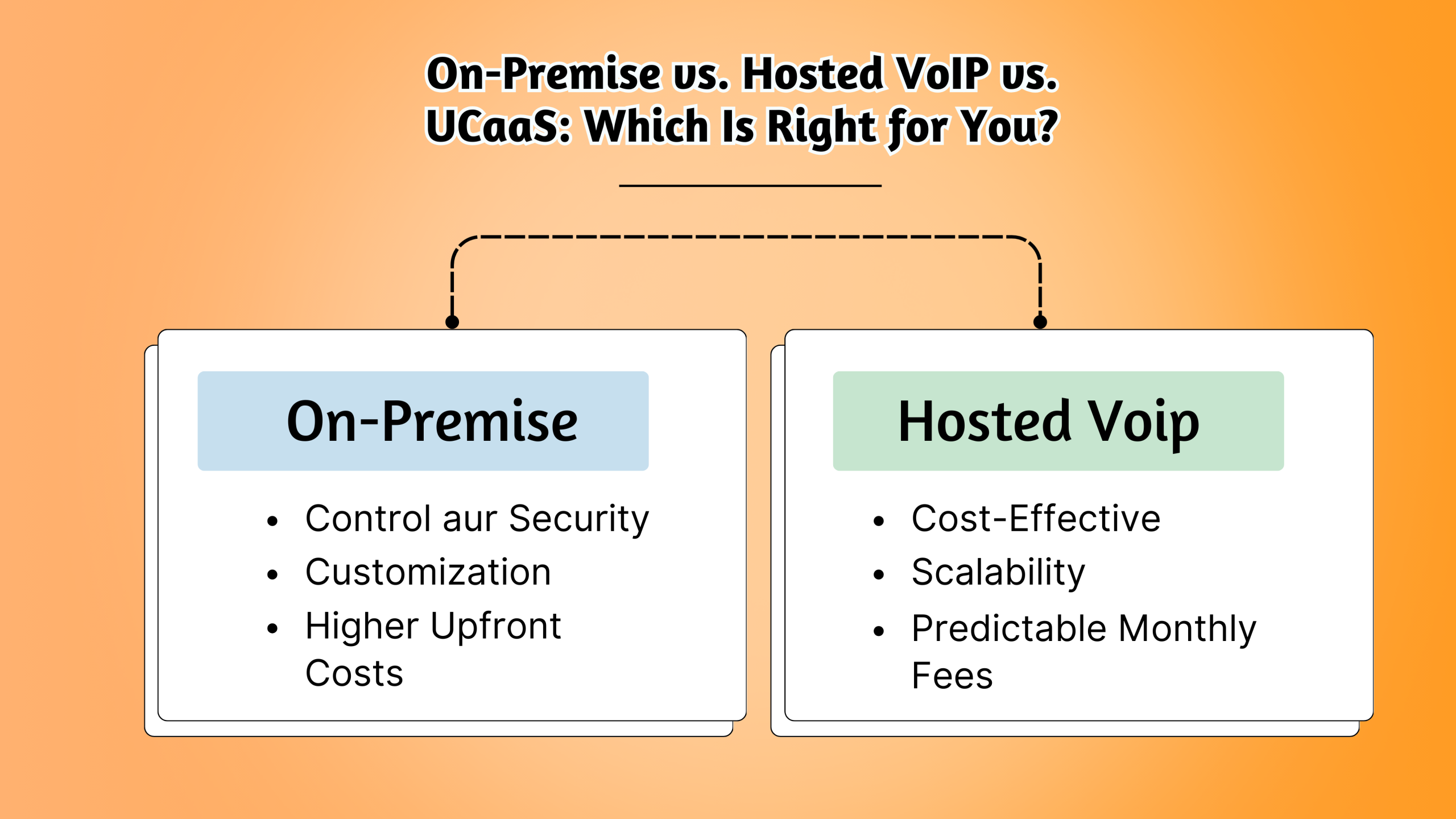
Understanding the landscape helps you make the right choice.
On-Premise VoIP
An on-premise VoIP system is a self-managed phone network where you purchase, install, and maintain all PBX hardware and software at your physical location. Equipment like servers and switches is housed on-site and managed by your internal IT team.
Best suited for large enterprises with strict security, compliance, or operational control requirements. It requires significant upfront investment and a dedicated IT staff to maintain and support the system.
Hosted VoIP
Hosted VoIP is a cloud-based phone system managed by a third-party provider. All infrastructure resides in secure, geo-redundant data centers, and users access the service via the internet through a subscription model.
Ideal for small to medium-sized businesses wanting robust phone features without managing hardware or infrastructure. It offers low upfront costs, easy scalability, and minimal IT involvement.
UCaaS (Unified Communications as a Service)
UCaaS builds on Managed VoIP by integrating voice, video, messaging, and collaboration tools into one cloud-based platform. It offers a unified experience across devices and locations, simplifying communication and increasing productivity.
Designed for modern, agile businesses—especially remote or hybrid teams—looking to consolidate tools, improve collaboration, and reduce the inefficiencies of juggling multiple communication apps.
[Expert Tip] If your business primarily needs a powerful and flexible phone system, Cloud-Based VoIP is the perfect solution. If you’re looking to unify all your communication tools (phone, video, chat) into a single app, then UCaaS is the better long-term choice.
How to Choose the Right Hosted VoIP Provider
Not all providers are created equal. Use this checklist when making your decision:
- Reliability: Look for a provider with a guaranteed uptime of 99.999% (less than 6 minutes of downtime per year).
- Customer Support: Do they offer 24/7, US-based support? Check reviews on sites like G2 and Capterra.
- Security & Compliance: Ensure they have robust security protocols and can meet any industry compliance needs (like HIPAA).
- Pricing Transparency: Avoid providers with hidden fees. Look for clear, all-inclusive pricing plans.
- Ease of Use: Is their online admin portal intuitive? Can you easily add users and change settings yourself?
Conclusion
Choosing a communication system is now a strategic decision. Hosted VoIP replaces costly, inflexible hardware with a cloud-based model that cuts expenses, supports remote work, and boosts productivity. With agility and mobility essential for growth, relying on outdated on-premise systems puts you at a disadvantage. Migrating to the cloud not only modernizes your communications but also future-proofs your business with a scalable, reliable platform ready to evolve with your needs.
Experience a More Powerful, Less Expensive Phone System
Letsdial offers Hosted VoIP with no hardware or surprise fees, lowering costs and freeing your IT team with all-inclusive plans.
FAQs
These terms are often used interchangeably. Both refer to a cloud-based phone system where the provider “hosts” the PBX technology. Hosted VoIP is the more modern and common term.
Yes. The process is called “porting,” and any reputable provider will handle the transfer of your existing phone numbers to their service with no downtime.
Each simultaneous call uses about 100 kbps of bandwidth. A standard business broadband connection can easily handle dozens of calls. The stability of your connection is more important than raw speed.
Your system can be configured to automatically forward calls to pre-set numbers, like mobile phones or an answering service, so you never miss an important call.

